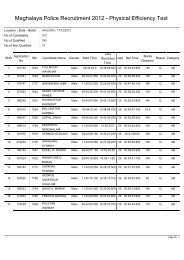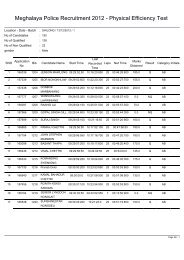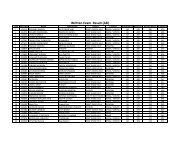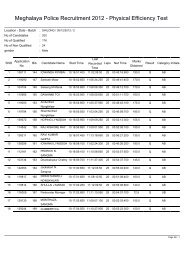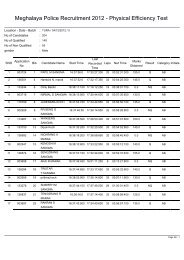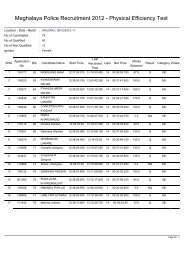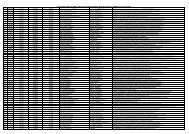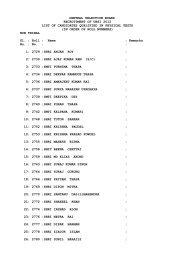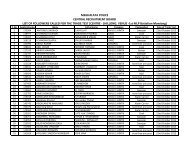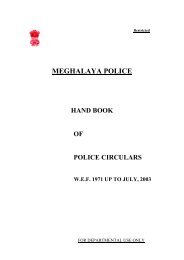The Protection of Children from Sexual Offences Act, 2012 - Govt. of ...
The Protection of Children from Sexual Offences Act, 2012 - Govt. of ...
The Protection of Children from Sexual Offences Act, 2012 - Govt. of ...
Create successful ePaper yourself
Turn your PDF publications into a flip-book with our unique Google optimized e-Paper software.
THE PROTECTION OF CHILDREN FROM SEXUAL OFFENCES ACT, <strong>2012</strong>NO. 32 OF <strong>2012</strong>[19th June, <strong>2012</strong>]An <strong>Act</strong> to protect children <strong>from</strong> <strong>of</strong>fences <strong>of</strong> sexual assault, sexual harassment andpornography and provide for establishment <strong>of</strong> Special Courts for trial <strong>of</strong> such <strong>of</strong>fences and for mattersconnected therewith or incidental thereto.WHEREAS clause (3) <strong>of</strong> article 15 <strong>of</strong> the Constitution, inter alia, empowers the State to makespecial provisions for children;AND WHEREAS, the Government <strong>of</strong> India has acceded on the 11th December, 1992 to theConvention on the Rights <strong>of</strong> the Child, adopted by the General Assembly <strong>of</strong> the United Nations, whichhas prescribed a set <strong>of</strong> standards to be followed by all State parties in securing the best interests <strong>of</strong>the child;AND WHEREAS it is necessary for the proper development <strong>of</strong> the child that his or her right toprivacy and confidentiality be protected and respected by every person by all means and through allstages <strong>of</strong> a judicial process involving the child;AND WHEREAS it is imperative that the law operates in a manner that the best interest andwell being <strong>of</strong> the child are regarded as being <strong>of</strong> paramount importance at every stage, to ensure thehealthy physical, emotional, intellectual and social development <strong>of</strong> the child;AND WHEREAS the State parties to the Convention on the Rights <strong>of</strong> the Child are required toundertake all appropriate national, bilateral and multilateral measures to prevent—(a) the inducement or coercion <strong>of</strong> a child to engage in any unlawful sexual activity;(b) the exploitative use <strong>of</strong> children in prostitution or other unlawful sexual practices;(c) the exploitative use <strong>of</strong> children in pornographic performances and materials;AND WHEREAS sexual exploitation and sexual abuse <strong>of</strong> children are heinous crimes andneed to be effectively addressed.BE it enacted by Parliament in the Sixty-third Year <strong>of</strong> the Republic <strong>of</strong> India as follows:—CHAPTER IPRELIMINARY1. Short title, extent and commencement.-(1) This <strong>Act</strong> may be called the <strong>Protection</strong> <strong>of</strong><strong>Children</strong> <strong>from</strong> <strong>Sexual</strong> <strong>Offences</strong> <strong>Act</strong>, <strong>2012</strong>.(2) It extends to the whole <strong>of</strong> India, except the State <strong>of</strong> Jammu and Kashmir.(3) It shall come into force on such date as the Central Government may, by notificationin the Official Gazette, appoint.2. Definitions.-(1) In this <strong>Act</strong>, unless the context otherwise requires, —(a) "aggravated penetrative sexual assault" has the same meaning as assigned to it in section5;(b) "aggravated sexual assault" has the same meaning as assigned to it in section 9;(c) "armed forces or security forces" means armed forces <strong>of</strong> the Union or security forces orpolice forces, as specified in the Schedule;(d) "child" means any person below the age <strong>of</strong> eighteen years;(e) "domestic relationship" shall have the same meaning as assigned to it in clause (f) <strong>of</strong>section 2 <strong>of</strong> the <strong>Protection</strong> <strong>of</strong> Women <strong>from</strong> Domestic Violence <strong>Act</strong>, 2005 (43 <strong>of</strong> 2005);(f) "penetrative sexual assault" has the same meaning as assigned to it in section 3;(g) “prescribed” means prescribed by rules made under this <strong>Act</strong>;
(h) “religious institution” shall have the same meaning as assigned to it in the ReligiousInstitutions (Prevention <strong>of</strong> Misuse) <strong>Act</strong>, 1988 (41 <strong>of</strong> 1988);(i) "sexual assault" has the same meaning as assigned to it in section 7;(j) "sexual harassment" has the same meaning as assigned to it in section 11;(k) "shared household" means a household where the person charged with the <strong>of</strong>fence livesor has lived at any time in a domestic relationship with the child;(l) "Special Court" means a court designated as such under section 28;(m) "Special Public Prosecutor" means a Public Prosecutor appointed under section 32.(2) <strong>The</strong> words and expressions used herein and not defined but defined in the Indian PenalCode (45 <strong>of</strong> 1860), the Code <strong>of</strong> Criminal Procedure, 1973 (2 <strong>of</strong> 1974), the Juvenile Justice (Care and<strong>Protection</strong> <strong>of</strong> <strong>Children</strong>) <strong>Act</strong>, 2000 (56 <strong>of</strong> 2000) and the Information Technology <strong>Act</strong>, 2000 (21 <strong>of</strong> 2000)shall have the meanings respectively assigned to them in the said Codes or the <strong>Act</strong>s.CHAPTER IISEXUAL OFFENCES AGAINST CHILDRENA.—PENETRATIVE SEXUAL ASSAULT AND PUNISHMENT THEREFOR3. Penetrative sexual assault.-A person is said to commit "penetrative sexual assault" if—(a) he penetrates his penis, to any extent, into the vagina, mouth, urethra or anus <strong>of</strong> achild or makes the child to do so with him or any other person; or(b) he inserts, to any extent, any object or a part <strong>of</strong> the body, not being the penis, into thevagina, the urethra or anus <strong>of</strong> the child or makes the child to do so with him or any other person; or(c) he manipulates any part <strong>of</strong> the body <strong>of</strong> the child so as to cause penetration into thevagina, urethra, anus or any part <strong>of</strong> body <strong>of</strong> the child or makes the child to do so with him or any otherperson; or(d) he applies his mouth to the penis, vagina, anus, urethra <strong>of</strong> the child or makes thechild to do so to such person or any other person.4. Punishment for penetrative sexual assault.-Whoever commits penetrative sexual assaultshall be punished with imprisonment <strong>of</strong> either description for a term which shall not be less thanseven years but which may extend to imprisonment for life, and shall also be liable to fine.B.—AGGRAVATED PENETRATIVE SEXUAL ASSAULT AND PUNISHMENT THEREFOR5. Aggravated penetrative sexual assault.-(a) Whoever, being a police <strong>of</strong>ficer, commitspenetrative sexual assault on a child —(i) within the limits <strong>of</strong> the police station or premises at which he is appointed; or(ii) in the premises <strong>of</strong> any station house, whether or not situated in the police station, to whichhe is appointed; or(iii) in the course <strong>of</strong> his duties or otherwise; or(iv) where he is known as, or identified as, a police <strong>of</strong>ficer; or(b) whoever being a member <strong>of</strong> the armed forces or security forces commits penetrativesexual assault on a child—(i) within the limits <strong>of</strong> the area to which the person is deployed; or(ii) in any areas under the command <strong>of</strong> the forces or armed forces; or(iii) in the course <strong>of</strong> his duties or otherwise; or(iv) where the said person is known or identified as a member <strong>of</strong> the security or armed forces;or(c) whoever being a public servant commits penetrative sexual assault on a child; or(d) whoever being on the management or on the staff <strong>of</strong> a jail, remand home, protectionhome, observation home, or other place <strong>of</strong> custody or care and protection established by or under any
law for the time being in force, commits penetrative sexual assault on a child, being inmate <strong>of</strong> suchjail, remand home, protection home, observation home, or other place <strong>of</strong> custody or care andprotection; or(e) whoever being on the management or staff <strong>of</strong> a hospital, whether Government or private,commits penetrative sexual assault on a child in that hospital; or(f) whoever being on the management or staff <strong>of</strong> an educational institution or religiousinstitution, commits penetrative sexual assault on a child in that institution; or(g) whoever commits gang penetrative sexual assault on a child.Explanation.—When a child is subjected to sexual assault by one or more persons <strong>of</strong> a groupin furtherance <strong>of</strong> their common intention, each <strong>of</strong> such persons shall be deemed to have committedgang penetrative sexual assault within the meaning <strong>of</strong> this clause and each <strong>of</strong> such person shall beliable for that act in the same manner as if it were done by him alone; or(h) whoever commits penetrative sexual assault on a child using deadly weapons, fire, heatedsubstance or corrosive substance; or(i) whoever commits penetrative sexual assault causing grievous hurt or causing bodily harmand injury or injury to the sexual organs <strong>of</strong> the child; or(j) whoever commits penetrative sexual assault on a child, which—(i) physically incapacitates the child or causes the child to become mentally ill as definedunder clause (b) <strong>of</strong> section 2 <strong>of</strong> the Mental Health <strong>Act</strong>, 1987 (14 <strong>of</strong> 1987) or causesimpairment <strong>of</strong> any kind so as to render the child unable to perform regular tasks, temporarilyor permanently; or(ii) in the case <strong>of</strong> female child, makes the child pregnant as a consequence <strong>of</strong> sexual assault;(iii) inflicts the child with Human Immunodeficiency Virus or any other life threatening diseaseor infection which may either temporarily or permanently impair the child by rendering himphysically incapacitated, or mentally ill to perform regular tasks; or(k) whoever, taking advantage <strong>of</strong> a child's mental or physical disability, commits penetrativesexual assault on the child; or(l) whoever commits penetrative sexual assault on the child more than once or repeatedly; or(m) whoever commits penetrative sexual assault on a child below twelve years; or(n) whoever being a relative <strong>of</strong> the child through blood or adoption or marriage orguardianship or in foster care or having a domestic relationship with a parent <strong>of</strong> the child orwho is living in the same or shared household with the child, commits penetrative sexualassault on such child; or(o) whoever being, in the ownership, or management, or staff, <strong>of</strong> any institution providingservices to the child, commits penetrative sexual assault on the child; or(p) whoever being in a position <strong>of</strong> trust or authority <strong>of</strong> a child commits penetrative sexualassault on the child in an institution or home <strong>of</strong> the child or anywhere else; or(q) whoever commits penetrative sexual assault on a child knowing the child is pregnant; or(r) whoever commits penetrative sexual assault on a child and attempts to murder the child; or(s) whoever commits penetrative sexual assault on a child in the course <strong>of</strong> communal orsectarian violence; or(t) whoever commits penetrative sexual assault on a child and who has been previouslyconvicted <strong>of</strong> having committed any <strong>of</strong>fence under this <strong>Act</strong> or any sexual <strong>of</strong>fence punishableunder any other law for the time being in force; or(u) whoever commits penetrative sexual assault on a child and makes the child to strip orparade naked in public,is said to commit aggravated penetrative sexual assault.6. Punishment for aggravated penetrative sexual assault.-Whoever, commits aggravatedpenetrative sexual assault, shall be punished with rigorous imprisonment for a term which shall not beless than ten years but which may extend to imprisonment for life and shall also be liable to fine.
C.—SEXUAL ASSAULT AND PUNISHMENT THEREFOR7. <strong>Sexual</strong> assault.-Whoever, with sexual intent touches the vagina, penis, anus or breast <strong>of</strong> thechild or makes the child touch the vagina, penis, anus or breast <strong>of</strong> such person or any other person,or does any other act with sexual intent which involves physical contact without penetration is said tocommit sexual assault.8. Punishment for sexual assault.-Whoever, commits sexual assault, shall be punished withimprisonment <strong>of</strong> either description for a term which shall not be less than three years but which mayextend to five years, and shall also be liable to fine.D.—AGGRAVATED SEXUAL ASSAULT AND PUNISHMENT THEREFOR9. Aggravated sexual assault.-(a) Whoever, being a police <strong>of</strong>ficer, commits sexual assault ona child—(i) within the limits <strong>of</strong> the police station or premises where he is appointed; or(ii) in the premises <strong>of</strong> any station house whether or not situated in the police station to whichhe is appointed; or(iii) in the course <strong>of</strong> his duties or otherwise; or(iv) where he is known as, or identified as a police <strong>of</strong>ficer; or(b) whoever, being a member <strong>of</strong> the armed forces or security forces, commits sexual assaulton a child—(i) within the limits <strong>of</strong> the area to which the person is deployed; or(ii) in any areas under the command <strong>of</strong> the security or armed forces; or(iii) in the course <strong>of</strong> his duties or otherwise; or(iv) where he is known or identified as a member <strong>of</strong> the security or armed forces; or(c) whoever being a public servant commits sexual assault on a child; or(d) whoever being on the management or on the staff <strong>of</strong> a jail, or remand home or protectionhome or observation home, or other place <strong>of</strong> custody or care and protection established by or underany law for the time being in force commits sexual assault on a child being inmate <strong>of</strong> such jail orremand home or protection home or observation home or other place <strong>of</strong> custody or care andprotection; or(e) whoever being on the management or staff <strong>of</strong> a hospital, whether Government or private,commits sexual assault on a child in that hospital; or(f) whoever being on the management or staff <strong>of</strong> an educational institution or religiousinstitution, commits sexual assault on a child in that institution; or(g) whoever commits gang sexual assault on a child.Explanation.—when a child is subjected to sexual assault by one or more persons <strong>of</strong> a groupin furtherance <strong>of</strong> their common intention, each <strong>of</strong> such persons shall be deemed to have committedgang sexual assault within the meaning <strong>of</strong> this clause and each <strong>of</strong> such person shall be liable for thatact in the same manner as if it were done by him alone; or(h) whoever commits sexual assault on a child using deadly weapons, fire, heated substanceor corrosive substance; or(i) whoever commits sexual assault causing grievous hurt or causing bodily harm and injury orinjury to the sexual organs <strong>of</strong> the child; or(j) whoever commits sexual assault on a child, which—(i) physically incapacitates the child or causes the child to become mentally ill as definedunder clause (l) <strong>of</strong> section 2 <strong>of</strong> the Mental Health <strong>Act</strong>, 1987 (14 <strong>of</strong> 1987) or causes impairment
<strong>of</strong> any kind so as to render the child unable to perform regular tasks, temporarily orpermanently; or(ii) inflicts the child with Human Immunodeficiency Virus or any other life threatening diseaseor infection which may either temporarily or permanently impair the child by rendering himphysically incapacitated, or mentally ill to perform regular tasks; or(k) whoever, taking advantage <strong>of</strong> a child’s mental or physical disability, commits sexualassault on the child; or(l) whoever commits sexual assault on the child more than once or repeatedly; or(m) whoever commits sexual assault on a child below twelve years; or(n) whoever, being a relative <strong>of</strong> the child through blood or adoption or marriage orguardianship or in foster care, or having domestic relationship with a parent <strong>of</strong> the child, or who isliving in the same or shared household with the child, commits sexual assault on such child; or(o) whoever, being in the ownership or management or staff, <strong>of</strong> any institution providingservices to the child, commits sexual assault on the child in such institution; or(p) whoever, being in a position <strong>of</strong> trust or authority <strong>of</strong> a child, commits sexual assault on thechild in an institution or home <strong>of</strong> the child or anywhere else; or(q) whoever commits sexual assault on a child knowing the child is pregnant; or(r) whoever commits sexual assault on a child and attempts to murder the child; or(s) whoever commits sexual assault on a child in the course <strong>of</strong> communal or sectarianviolance; or(t) whoever commits sexual assault on a child and who has been previously convicted <strong>of</strong>having committed any <strong>of</strong>fence under this <strong>Act</strong> or any sexual <strong>of</strong>fence punishable under any other law forthe time being in force; or(u) whoever commits sexual assault on a child and makes the child to strip or parade naked inpublic, is said to commit aggravated sexual assault.10. Punishment for aggravated sexual assault.-Whoever, commits aggravated sexual assaultshall be punished with imprisonment <strong>of</strong> either description for a term which shall not be less than fiveyears but which may extend to seven years, and shall also be liable to fine.E.—SEXUAL HARASSMENT AND PUNISHMENT THEREFOR11. <strong>Sexual</strong> harassment.-A person is said to commit sexual harassment upon a child when suchperson with sexual intent,—(i) utters any word or makes any sound, or makes any gesture or exhibits any object or part <strong>of</strong>body with the intention that such word or sound shall be heard, or such gesture or object orpart <strong>of</strong> body shall be seen by the child; or(ii) makes a child exhibit his body or any part <strong>of</strong> his body so as it is seen by such person orany other person; or(iii) shows any object to a child in any form or media for pornographic purposes; or(iv) repeatedly or constantly follows or watches or contacts a child either directly or throughelectronic, digital or any other means; or(v) threatens to use, in any form <strong>of</strong> media, a real or fabricated depiction through electronic,film or digital or any other mode, <strong>of</strong> any part <strong>of</strong> the body <strong>of</strong> the child or the involvement <strong>of</strong> thechild in a sexual act; or(vi) entices a child for pornographic purposes or gives gratification therefor.Explanation.—Any question which involves “sexual intent” shall be a question <strong>of</strong> fact.
12. Punishment for sexual harassment.-Whoever, commits sexual harassment upon a child shallbe punished with imprisonment <strong>of</strong> either description for a term which may extend to three years andshall also be liable to fine.CHAPTER IIIUSING CHILD FOR PORNOGRAPHIC PURPOSES AND PUNISHMENT THEREFOR13. Use <strong>of</strong> child for pornographic purposes.-Whoever, uses a child in any form <strong>of</strong> media(including programme or advertisement telecast by television channels or internet or any otherelectronic form or printed form, whether or not such programme or advertisement is intended forpersonal use or for distribution), for the purposes <strong>of</strong> sexual gratification, which includes—(a) representation <strong>of</strong> the sexual organs <strong>of</strong> a child;(b) usage <strong>of</strong> a child engaged in real or simulated sexual acts (with or without penetration);(c) the indecent or obscene representation <strong>of</strong> a child,shall be guilty <strong>of</strong> the <strong>of</strong>fence <strong>of</strong> using achild for pornographic purposes.Explanation.—For the purposes <strong>of</strong> this section, the expression ‘‘use a child’’ shall includeinvolving a child through any medium like print, electronic, computer or any other technology forpreparation, production, <strong>of</strong>fering, transmitting, publishing, facilitation and distribution <strong>of</strong> thepornographic material.14. Punishment for using child for pornographic purposes.-(1) Whoever, uses a child orchildren for pornographic purposes shall be punished with imprisonment <strong>of</strong> either description whichmay extend to five years and shall also be liable to fine and in the event <strong>of</strong> second or subsequentconviction with imprisonment <strong>of</strong> either description for a term which may extend to seven years andalso be liable to fine.(2) If the person using the child for pornographic purposes commits an <strong>of</strong>fence referred to insection 3, by directly participating in pornographic acts, he shall be punished with imprisonment <strong>of</strong>either description for a term which shall not be less than ten years but which may extend toimprisonment for life, and shall also be liable to fine.(3) If the person using the child for pornographic purposes commits an <strong>of</strong>fence referred to insection 5, by directly participating in pornographic acts, he shall be punished with rigorousimprisonment for life and shall also be liable to fine.(4) If the person using the child for pornographic purposes commits an <strong>of</strong>fence referred to insection 7, by directlyparticipating in pornographic acts, he shall be punished with imprisonment <strong>of</strong> either description for aterm which shallnot be less than six years but which may extend to eight years, and shall also be liable to fine.(5) If the person using the child for pornographic purposes commits an <strong>of</strong>fence referred to insection 9, by directly participating in pornographic acts, he shall be punished with imprisonment <strong>of</strong>either description for a term which shall not be less than eight years but which may extend to tenyears, and shall also be liable to fine.15. Punishment for storage <strong>of</strong> pornographic material involving child.-Any person, whostores, for commercial purposes any pornographic material in any form involving a child shall bepunished with imprisonment <strong>of</strong> either description which may extend to three years or with fine or withboth.CHAPTER IVABETMENT OF AND ATTEMPT TO COMMIT AN OFFENCE16. Abetment <strong>of</strong> an <strong>of</strong>fence.-A person abets an <strong>of</strong>fence, who—First.— Instigates any person to do that <strong>of</strong>fence; or
Secondly.— Engages with one or more other person or persons in any conspiracy for thedoing <strong>of</strong> that <strong>of</strong>fence, if an act or illegal omission takes place in pursuance <strong>of</strong> that conspiracy, and inorder to the doing <strong>of</strong> that <strong>of</strong>fence; orThirdly.—Intentionally aids, by any act or illegal omission, the doing <strong>of</strong> that <strong>of</strong>fence.Explanation I.— A person who, by wilful misrepresentation, or by wilful concealment <strong>of</strong> amaterial fact, which he is bound to disclose, voluntarily causes or procures, or attempts to cause orprocure a thing to be done, is said to instigate the doing <strong>of</strong> that <strong>of</strong>fence.Explanation II.—Whoever, either prior to or at the time <strong>of</strong> commission <strong>of</strong> an act, does anythingin order to facilitate the commission <strong>of</strong> that act, and thereby facilitates the commission there<strong>of</strong>, is saidto aid the doing <strong>of</strong> that act.Explanation III.—Whoever employ, harbours, receives or transports a child, by means <strong>of</strong>threat or use <strong>of</strong> force or other forms <strong>of</strong> coercion, abduction, fraud, deception, abuse <strong>of</strong> power or <strong>of</strong> aposition, vulnerability or the giving or receiving <strong>of</strong> payments or benefits to achieve the consent <strong>of</strong> aperson having control over another person, for the purpose <strong>of</strong> any <strong>of</strong>fence under this <strong>Act</strong>, is said toaid the doing <strong>of</strong> that act.17. Punishment for abetment.-Whoever abets any <strong>of</strong>fence under this <strong>Act</strong>, if the act abetted iscommitted in consequence <strong>of</strong> the abetment, shall be punished with punishment provided for that<strong>of</strong>fence.Explanation. — An act or <strong>of</strong>fence is said to be committed in consequence <strong>of</strong> abetment, when it iscommitted in consequence <strong>of</strong> the instigation, or in pursuance <strong>of</strong> the conspiracy or with the aid, whichconstitutes the abetment.18. Punishment for attempt to commit an <strong>of</strong>fence.-Whoever attempts to commit any <strong>of</strong>fencepunishable under this <strong>Act</strong> or to cause such an <strong>of</strong>fence to be committed, and in such attempt, does anyact towards the commission <strong>of</strong> the <strong>of</strong>fence, shall be punished with imprisonment <strong>of</strong> any descriptionprovided for the <strong>of</strong>fence, for a term which may extend to onehalf <strong>of</strong> the imprisonment for life or, as thecase may be, one-half <strong>of</strong> the longest term <strong>of</strong> imprisonment provided for that <strong>of</strong>fence or with fine orwith both.CHAPTER VPROCEDURE FOR REPORTING OF CASES19. Reporting <strong>of</strong> <strong>of</strong>fences.-(1) Notwithstanding anything contained in the Code <strong>of</strong> CriminalProcedure, 1973 (2 <strong>of</strong> 1974), any person (including the child), who has apprehension that an <strong>of</strong>fenceunder this <strong>Act</strong> is likely to be committed or has knowledge that such an <strong>of</strong>fence has been committed,he shall provide such information to,—(a) the Special Juvenile Police Unit; or(b) the local police.(2) Every report given under sub-section (1) shall be—(a) ascribed an entry number and recorded in writing;(b) be read over to the informant;(c) shall be entered in a book to be kept by the Police Unit.(3) Where the report under sub-section (1) is given by a child, the same shall berecorded under sub-section (2) in a simple language so that the child understands contents beingrecorded.(4) In case contents are being recorded in the language not understood by the child orwherever it is deemed necessary, a translator or an interpreter, having such qualifications, experience
and on payment <strong>of</strong> such fees as may be prescribed, shall be provided to the child if he fails tounderstand the same.(5) Where the Special Juvenile Police Unit or local police is satisfied that the childagainst whom an <strong>of</strong>fence has been committed is in need <strong>of</strong> care and protection, then, it shall, afterrecording the reasons in writing, make immediate arrangement to give him such care and protection(including admitting the child into shelter home or to the nearest hospital) within twenty-four hours <strong>of</strong>the report, as may be prescribed.(6) <strong>The</strong> Special Juvenile Police Unit or local police shall, without unnecessary delay butwithin a period <strong>of</strong> twenty-four hours, report the matter to the Child Welfare Committee and the SpecialCourt or where no Special Court has been designated, to the Court <strong>of</strong> Session, including need <strong>of</strong> thechild for care and protection and steps taken in this regard.(7) No person shall incur any liability, whether civil or criminal, for giving the informationin good faith for the purpose <strong>of</strong> sub-section (1).20. Obligation <strong>of</strong> media, studio and photographic facilities to report cases.–Any personnel<strong>of</strong> the media or hotel or lodge or hospital or club or studio or photographic facilities, by whatever namecalled, irrespective <strong>of</strong> the number <strong>of</strong> persons employed therein, shall, on coming across any materialor object which is sexually exploitative <strong>of</strong> the child (including pornographic, sexually-related or makingobscene representation <strong>of</strong> a child or children) through the use <strong>of</strong> any medium, shall provide suchinformation to the Special Juvenile Police Unit, or to the local police, as the case may be.21. Punishment for failure to report or record a case.-(1) Any person, who fails to report thecommission <strong>of</strong> an <strong>of</strong>fence under sub-section (1) <strong>of</strong> section 19 or section 20 or who fails to record such<strong>of</strong>fence under sub-section (2) <strong>of</strong> section 19 shall be punished with imprisonment <strong>of</strong> either descriptionwhich may extend to six months or with fine or with both.(2) Any person, being in-charge <strong>of</strong> any company or an institution (by whatever namecalled) who fails to report the commission <strong>of</strong> an <strong>of</strong>fence under sub-section (1) <strong>of</strong> section 19 in respect<strong>of</strong> a subordinate under his control, shall be punished with imprisonment for a term which may extendto one year and with fine.(3) <strong>The</strong> provisions <strong>of</strong> sub-section (1) shall not apply to a child under this <strong>Act</strong>.22. Punishment for false complaint or false information.-(1) Any person, who makes falsecomplaint or provides false information against any person, in respect <strong>of</strong> an <strong>of</strong>fence committed undersections 3, 5, 7 and section 9, solely with the intention to humiliate, extort or threaten or defame him,shall be punished with imprisonment for a term which may extend to six months or with fine or withboth.(2) Where a false complaint has been made or false information has been provided by a child,no punishment shall be imposed on such child.(3) Whoever, not being a child, makes a false complaint or provides false information againsta child, knowing it to be false, thereby victimising such child in any <strong>of</strong> the <strong>of</strong>fences under this<strong>Act</strong>, shall be punished with imprisonment which may extend to one year or with fine or withboth.23. Procedure for media.-(1) No person shall make any report or present comments on anychild <strong>from</strong> any form <strong>of</strong> media or studio or photographic facilities without having complete and authenticinformation, which may have the effect <strong>of</strong> lowering his reputation or infringing upon his privacy.(2) No reports in any media shall disclose, the identity <strong>of</strong> a child including his name,address, photograph, family details, school, neighbourhood or any other particulars which may lead todisclosure <strong>of</strong> identity <strong>of</strong> the child:Provided that for reasons to be recorded in writing, the Special Court, competent to try thecase under the <strong>Act</strong>, may permit such disclosure, if in its opinion such disclosure is in the interest <strong>of</strong>the child.
(3) <strong>The</strong> publisher or owner <strong>of</strong> the media or studio or photographic facilities shall be jointlyand severally liable for the acts and omissions <strong>of</strong> his employee.(4) Any person who contravenes the provisions <strong>of</strong> sub-section (1) or sub-section (2) shallbe liable to be punished with imprisonment <strong>of</strong> either description for a period which shall not be lessthan six months but which may extend to one year or with fine or with both.CHAPTER VIPROCEDURES FOR RECORDING STATEMENT OF THE CHILD24. Recording <strong>of</strong> statement <strong>of</strong> a child.-(1) <strong>The</strong> statement <strong>of</strong> the child shall be recorded at theresidence <strong>of</strong> the child or at a place where he usually resides or at the place <strong>of</strong> his choice and as far aspracticable by a woman police <strong>of</strong>ficer not below the rank <strong>of</strong> sub-inspector.(2) <strong>The</strong> police <strong>of</strong>ficer while recording the statement <strong>of</strong> the child shall not be in uniform.(3) <strong>The</strong> police <strong>of</strong>ficer making the investigation, shall, while examining the child, ensurethat at no point <strong>of</strong> time the child come in the contact in any way with the accused.(4) No child shall be detained in the police station in the night for any reason.(5) <strong>The</strong> police <strong>of</strong>ficer shall ensure that the identity <strong>of</strong> the child is protected <strong>from</strong> the publicmedia, unless otherwise directed by the Special Court in the interest <strong>of</strong> the child.25. Recording <strong>of</strong> statement <strong>of</strong> a child by Magistrate.-(1) If the statement <strong>of</strong> the child is beingrecorded under section 164 <strong>of</strong> the Code <strong>of</strong> Criminal Procedure, 1973 (2 <strong>of</strong> 1974) (herein referred to asthe Code), the Magistrate recording such statement shall, notwithstanding anything contained therein,record the statement as spoken by the child:Provided that the provisions contained in the first proviso to sub-section (1) <strong>of</strong> section 164 <strong>of</strong>the Code shall, so far it permits the presence <strong>of</strong> the advocate <strong>of</strong> the accused shall not apply in thiscase.(2) <strong>The</strong> Magistrate shall provide to the child and his parents or his representative, a copy<strong>of</strong> the document specified under section 207 <strong>of</strong> the Code, upon the final report being filed by thepolice under section 173 <strong>of</strong> that Code.26. Additional provisions regarding statement to be recorded.-(1) <strong>The</strong> Magistrate or thepolice <strong>of</strong>ficer, as the case may be, shall record the statement as spoken by the child in the presence<strong>of</strong> the parents <strong>of</strong> the child or any other person in whom the child has trust or confidence.(2) Wherever necessary, the Magistrate or the police <strong>of</strong>ficer, as the case may be, maytake the assistance <strong>of</strong> a translator or an interpreter, having such qualifications, experience and onpayment <strong>of</strong> such fees as may be prescribed, while recording the statement <strong>of</strong> the child.(3) <strong>The</strong> Magistrate or the police <strong>of</strong>ficer, as the case may be, may, in the case <strong>of</strong> a childhaving a mental or physical disability, seek the assistance <strong>of</strong> a special educator or any person familiarwith the manner <strong>of</strong> communication <strong>of</strong> the child or an expert in that field, having such qualifications,experience and on payment <strong>of</strong> such fees as may be prescribed, to record the statement <strong>of</strong> the child.(4) Wherever possible, the Magistrate or the police <strong>of</strong>ficer, as the case may be, shallensure that the statement <strong>of</strong> the child is also recorded by audio-video electronic means.27. Medical examination <strong>of</strong> a child.-(1) <strong>The</strong> medical examination <strong>of</strong> a child in respect <strong>of</strong> whomany <strong>of</strong>fence has been committed under this <strong>Act</strong>, shall, notwithstanding that a First Information Reportor complaint has not been registered for the <strong>of</strong>fences under this <strong>Act</strong>, be conducted in accordance withsection 164A <strong>of</strong> the Code <strong>of</strong> Criminal Procedure, 1973 (2 <strong>of</strong> 1974).(2) In case the victim is a girl child, the medical examination shall be conducted by awoman doctor.
(3) <strong>The</strong> medical examination shall be conducted in the presence <strong>of</strong> the parent <strong>of</strong> the childor any other person in whom the child reposes trust or confidence.(4) Where, in case the parent <strong>of</strong> the child or other person referred to in sub-section (3)cannot be present, for any reason, during the medical examination <strong>of</strong> the child, the medicalexamination shall be conducted in the presence <strong>of</strong> a woman nominated by the head <strong>of</strong> the medicalinstitution.CHAPTER VIISPECIAL COURTS28. Designation <strong>of</strong> Special Courts.-(1) For the purposes <strong>of</strong> providing a speedy trial, the StateGovernment shall in consultation with the Chief Justice <strong>of</strong> the High Court, by notification in the OfficialGazette, designate for each district, a Court <strong>of</strong> Session to be a Special Court to try the <strong>of</strong>fences underthe <strong>Act</strong>:Provided that if a Court <strong>of</strong> Session is notified as a children’s court under the Commissions for<strong>Protection</strong> <strong>of</strong> Child Rights <strong>Act</strong>, 2005 (4 <strong>of</strong> 2006) or a Special Court designated for similar purposesunder any other law for the time being in force, then, such court shall be deemed to be a SpecialCourt under this section.(2) While trying an <strong>of</strong>fence under this <strong>Act</strong>, a Special Court shall also try an <strong>of</strong>fence [otherthan the <strong>of</strong>fence referred to in sub-section (1)], with which the accused may, under the Code <strong>of</strong>Criminal Procedure, 1973 (2 <strong>of</strong> 1974), be charged at the same trial.(3) <strong>The</strong> Special Court constituted under this <strong>Act</strong>, notwithstanding anything in theInformation Technology <strong>Act</strong>, 2000 (21 <strong>of</strong> 2000), shall have jurisdiction to try <strong>of</strong>fences under section67B <strong>of</strong> that <strong>Act</strong> in so far as it relates to publication or transmission <strong>of</strong> sexually explicit materialdepicting children in any act, or conduct or manner or facilitates abuse <strong>of</strong> children online.29. Presumption as to certain <strong>of</strong>fences.-Where a person is prosecuted for committing orabetting or attempting to commit any <strong>of</strong>fence under sections 3, 5, 7 and section 9 <strong>of</strong> this <strong>Act</strong>, theSpecial Court shall presume, that such person has committed or abetted or attempted to commit the<strong>of</strong>fence, as the case may be unless the contrary is proved.30. Presumption <strong>of</strong> culpable mental state.-(1) In any prosecution for any <strong>of</strong>fence under this <strong>Act</strong>which requires a culpable mental state on the part <strong>of</strong> the accused, the Special Court shall presumethe existence <strong>of</strong> such mental state but it shall be a defence for the accused to prove the fact that hehad no such mental state with respect to the act charged as an <strong>of</strong>fence in that prosecution.(2) For the purposes <strong>of</strong> this section, a fact is said to be proved only when the SpecialCourt believes it to exist beyond reasonable doubt and not merely when its existence is establishedby a preponderance <strong>of</strong> probability.Explanation.—In this section, "culpable mental state" includes intention, motive, knowledge <strong>of</strong>a fact and the belief in, or reason to believe, a fact.31. Application <strong>of</strong> Code <strong>of</strong> Criminal Procedure, 1973 to proceedings before a SpecialCourt.-Save as otherwise provided in this <strong>Act</strong>, the provisions <strong>of</strong> the Code <strong>of</strong> Criminal Procedure, 1973(2 <strong>of</strong> 1974) (including the provisions as to bail and bonds) shall apply to the proceedings before aSpecial Court and for the purposes <strong>of</strong> the said provisions, the Special Court shall be deemed to be aCourt <strong>of</strong> Sessions and the person conducting a prosecution before a Special Court, shall be deemedto be a Public Prosecutor.32. Special Public Prosecutors.–(1) <strong>The</strong> State Government shall, by notification in the OfficialGazette, appoint a Special Public Prosecutor for every Special Court for conducting cases only underthe provisions <strong>of</strong> this <strong>Act</strong>.
(2) A person shall be eligible to be appointed as a Special Public Prosecutor under subsection(1) only if he had been in practice for not less than seven years as an advocate.(3) Every person appointed as a Special Public Prosecutor under this section shall bedeemed to be a Public Prosecutor within the meaning <strong>of</strong> clause (u) <strong>of</strong> section 2 <strong>of</strong> the Code <strong>of</strong>Criminal Procedure , 1973 (2 <strong>of</strong> 1974) and provision <strong>of</strong> that Code shall have effect accordingly.CHAPTER VIIIPROCEDURE AND POWERS OF SPECIAL COURTS AND RECORDING OF EVIDENCE33. Procedure and powers <strong>of</strong> Special Court.-(1) A Special Court may take cognizance <strong>of</strong> any<strong>of</strong>fence, without the accused being committed to it for trial, upon receiving a complaint <strong>of</strong> facts whichconstitute such <strong>of</strong>fence, or upon a police report <strong>of</strong> such facts.(2) <strong>The</strong> Special Public Prosecutor, or as the case may be, the counsel appearing for theaccused shall, while recording the examination-in-chief, cross-examination or re-examination <strong>of</strong> thechild, communicate the questions to be put to the child to the Special Court which shall in turn putthose questions to the child.(3) <strong>The</strong> Special Court may, if it considers necessary, permit frequent breaks for the childduring the trial.(4) <strong>The</strong> Special Court shall create a child-friendly atmosphere by allowing a familymember, a guardian, a friend or a relative, in whom the child has trust or confidence, to be present inthe court.court.(5) <strong>The</strong> Special Court shall ensure that the child is not called repeatedly to testify in the(6) <strong>The</strong> Special Court shall not permit aggressive questioning or character assassination<strong>of</strong> the child and ensure that dignity <strong>of</strong> the child is maintained at all times during the trial.(7) <strong>The</strong> Special Court shall ensure that the identity <strong>of</strong> the child is not disclosed at anytime during the course <strong>of</strong> investigation or trial:Provided that for reasons to be recorded in writing, the Special Court may permit suchdisclosure, if in its opinion such disclosure is in the interest <strong>of</strong> the child.Explanation.—For the purposes <strong>of</strong> this sub-section, the identity <strong>of</strong> the child shall include theidentity <strong>of</strong> the child's family, school, relatives, neighbourhood or any other information by which theidentity <strong>of</strong> the child may be revealed.(8) In appropriate cases, the Special Court may, in addition to the punishment, directpayment <strong>of</strong> such compensation as may be prescribed to the child for any physical or mental traumacaused to him or for immediate rehabilitation <strong>of</strong> such child.(9) Subject to the provisions <strong>of</strong> this <strong>Act</strong>, a Special Court shall, for the purpose <strong>of</strong> the trial<strong>of</strong> any <strong>of</strong>fence under this <strong>Act</strong>, have all the powers <strong>of</strong> a Court <strong>of</strong> Session and shall try such <strong>of</strong>fence asif it were a Court <strong>of</strong> Session, and as far as may be, in accordance with the procedure specified in theCode <strong>of</strong> Criminal Procedure, 1973 (2 <strong>of</strong> 1974) for trial before a Court <strong>of</strong> Session.34. Procedure in case <strong>of</strong> commission <strong>of</strong> <strong>of</strong>fence by child and determination <strong>of</strong> age bySpecial Court.-(1) Where any <strong>of</strong>fence under this <strong>Act</strong> is committed by a child, such child shall be dealtwith under the provisions <strong>of</strong> the Juvenile Justice (Care and <strong>Protection</strong> <strong>of</strong> <strong>Children</strong>) <strong>Act</strong>, 2000 (56 <strong>of</strong>2000).(2) If any question arises in any proceeding before the Special Court whether a person isa child or not, such question shall be determined by the Special Court after satisfying itself about theage <strong>of</strong> such person and it shall record in writing its reasons for such determination.
(3) No order made by the Special Court shall be deemed to be invalid merely by anysubsequent pro<strong>of</strong> that the age <strong>of</strong> a person as determined by it under sub-section (2) was not thecorrect age <strong>of</strong> that person.35. Period for recording <strong>of</strong> evidence <strong>of</strong> child and disposal <strong>of</strong> case.-(1) <strong>The</strong> evidence <strong>of</strong> thechild shall be recorded within a period <strong>of</strong> thirty days <strong>of</strong> the Special Court taking cognizance <strong>of</strong> the<strong>of</strong>fence and reasons for delay, if any, shall be recorded by the Special Court.(2) <strong>The</strong> Special Court shall complete the trial, as far as possible, within a period <strong>of</strong> oneyear <strong>from</strong> the date <strong>of</strong> taking cognizance <strong>of</strong> the <strong>of</strong>fence.36. Child not to see accused at the time <strong>of</strong> testifying.-(1) <strong>The</strong> Special Court shall ensure thatthe child is not exposed in any way to the accused at the time <strong>of</strong> recording <strong>of</strong> the evidence, while atthe same time ensuring that the accused is in a position to hear the statement <strong>of</strong> the child andcommunicate with his advocate.(2) For the purposes <strong>of</strong> sub-section (1), the Special Court may record the statement <strong>of</strong> achild through video conferencing or by utilising single visibility mirrors or curtains or any other device.37. Trials to be conducted in camera.-<strong>The</strong> Special Court shall try cases in camera and in thepresence <strong>of</strong> the parents <strong>of</strong> the child or any other person in whom the child has trust or confidence:Provided that where the Special Court is <strong>of</strong> the opinion that the child needs to be examined at a placeother than the court, it shall proceed to issue a commission in accordance with the provisions <strong>of</strong>section 284 <strong>of</strong> the Code <strong>of</strong> Criminal Procedure, 1973 (2 <strong>of</strong> 1974).38. Assistance <strong>of</strong> an interpreter or expert while recording evidence <strong>of</strong> child.-(1) Wherevernecessary, the Court may take the assistance <strong>of</strong> a translator or interpreter having such qualifications,experience and on payment <strong>of</strong> such fees as may be prescribed, while recording the evidence <strong>of</strong> thechild.(2) If a child has a mental or physical disability, the Special Court may take theassistance <strong>of</strong> a special educator or any person familiar with the manner <strong>of</strong> communication <strong>of</strong> the childor an expert in that field, having such qualifications, experience and on payment <strong>of</strong> such fees as maybe prescribed to record the evidence <strong>of</strong> the child.CHAPTER IXMISCELLANEOUS39. Guidelines for child to take assistance <strong>of</strong> experts, etc.-Subject to such rules as may bemade in this behalf, the State Government shall prepare guidelines for use <strong>of</strong> non-governmentalorganisations, pr<strong>of</strong>essionals and experts or persons having knowledge <strong>of</strong> psychology, social work,physical health, mental health and child development to be associated with the pre-trial and trial stageto assist the child.40. Right <strong>of</strong> child to take assistance <strong>of</strong> legal practitioner.-Subject to the proviso to section301 <strong>of</strong> the Code <strong>of</strong> Criminal Procedure, 1973 (2 <strong>of</strong> 1974) the family or the guardian <strong>of</strong> the child shallbe entitled to the assistance <strong>of</strong> a legal counsel <strong>of</strong> their choice for any <strong>of</strong>fence under this <strong>Act</strong>:Provided that if the family or the guardian <strong>of</strong> the child are unable to afford a legal counsel, theLegal Services Authority shall provide a lawyer to them.41. Provisions <strong>of</strong> sections 3 to 13 not to apply in certain cases.-<strong>The</strong> provisions <strong>of</strong> sections 3to 13 (both inclusive) shall not apply in case <strong>of</strong> medical examination or medical treatment <strong>of</strong> a childwhen such medical examination or medical treatment is undertaken with the consent <strong>of</strong> his parents orguardian.42. Alternative punishment.-Where an act or omission constitute an <strong>of</strong>fence punishable underthis <strong>Act</strong> and also under any other law for the time being in force, then, notwithstanding anythingcontained in any law for the time being in force, the <strong>of</strong>fender found guilty <strong>of</strong> such <strong>of</strong>fence shall beliable to punishment only under such law or this <strong>Act</strong> as provides for punishment which is greater indegree.
43. Public awareness about <strong>Act</strong>.-<strong>The</strong> Central Government and every State Government, shalltake all measures to ensure that—(a) the provisions <strong>of</strong> this <strong>Act</strong> are given wide publicity through media including thetelevision, radio and the print media at regular intervals to make the general public, children as well astheir parents and guardians aware <strong>of</strong> the provisions <strong>of</strong> this <strong>Act</strong>;(b) the <strong>of</strong>ficers <strong>of</strong> the Central Government and the State Governments and otherconcerned persons (including the police <strong>of</strong>ficers) are imparted periodic training on the matters relatingto the implementation <strong>of</strong> the provisions <strong>of</strong> the <strong>Act</strong>.44. Monitoring <strong>of</strong> implementation <strong>of</strong> <strong>Act</strong>.-(1) <strong>The</strong> National Commission for <strong>Protection</strong> <strong>of</strong> ChildRights constituted under section 3, or as the case may be, the State Commission for <strong>Protection</strong> <strong>of</strong>Child Rights constituted under section 17, <strong>of</strong> the Commissions for <strong>Protection</strong> <strong>of</strong> Child Rights <strong>Act</strong>, 2005(4 <strong>of</strong> 2006), shall, in addition to the functions assigned to them under that <strong>Act</strong>, also monitor theimplementation <strong>of</strong> the provisions <strong>of</strong> this <strong>Act</strong> in such manner as may be prescribed.(2) <strong>The</strong> National Commission or, as the case may be, the State Commission, referred toin sub-section (1), shall, while inquiring into any matter relating to any <strong>of</strong>fence under this <strong>Act</strong>, have thesame powers as are vested in it under the Commissions for <strong>Protection</strong> <strong>of</strong> Child Rights <strong>Act</strong>, 2005 (4 <strong>of</strong>2006).(3) <strong>The</strong> National Commission or, as the case may be, the State Commission, referred toin sub-section (1), shall, also include, its activities under this section, in the annual report referred to insection 16 <strong>of</strong> the Commissions for <strong>Protection</strong> <strong>of</strong> Child Rights <strong>Act</strong>, 2005 (4 <strong>of</strong> 2006).45. Power to make rules.-(1) <strong>The</strong> Central Government may, by notification in the OfficialGazette, make rules for carrying out the purposes <strong>of</strong> this <strong>Act</strong>.(2) In particular, and without prejudice to the generality <strong>of</strong> the foregoing powers, suchrules may provide for all or any <strong>of</strong> the following matters, namely:—(a) the qualifications and experience <strong>of</strong>, and the fees payable to, a translator or an interpreter,a special educator or any person familiar with the manner <strong>of</strong> communication <strong>of</strong> the child or anexpert in that field, under sub-section (4) <strong>of</strong> section 19; sub-sections (2) and (3) <strong>of</strong> section 26and section 38;(b) care and protection and emergency medical treatment <strong>of</strong> the child under sub-section (5) <strong>of</strong>section 19;(c) the payment <strong>of</strong> compensation under sub-section (8) <strong>of</strong> section 33;(d) the manner <strong>of</strong> periodic monitoring <strong>of</strong> the provisions <strong>of</strong> the <strong>Act</strong> under sub-section (1) <strong>of</strong>section 44.(3) Every rule made under this section shall be laid, as soon as may be after it is made,before each House <strong>of</strong> Parliament, while it is in session, for a total period <strong>of</strong> thirty days which may becomprised in one session or in two or more successive sessions, and if, before the expiry <strong>of</strong> thesession immediately following the session or the successive sessions aforesaid, both Houses agreein making any modification in the rule or both Houses agree that the rule should not be made, the ruleshall thereafter have effect only in such modified form or be <strong>of</strong> no effect, as the case may be; so,however, that any such modification or annulment shall be without prejudice to the validity <strong>of</strong> anythingpreviously done under that rule.46. Power to remove difficulties.-(1) If any difficulty arises in giving effect to the provisions <strong>of</strong>this <strong>Act</strong>, the Central Government may, by order published in the Official Gazette, make suchprovisions not inconsistent with the provisions <strong>of</strong> this <strong>Act</strong> as may appear to it to be necessary orexpedient for removal <strong>of</strong> the difficulty:Provided that no order shall be made under this section after the expiry <strong>of</strong> the period <strong>of</strong> twoyears <strong>from</strong> the commencement <strong>of</strong> this <strong>Act</strong>.
(2) Every order made under this section shall be laid, as soon as may be after it is made,before each House <strong>of</strong> Parliament.
THE SCHEDULE[See section 2(c)]ARMED FORCES AND SECURITY FORCES CONSTITUTED UNDER(a) <strong>The</strong> Air Force <strong>Act</strong>, 1950 (45 <strong>of</strong> 1950);(b) <strong>The</strong> Army <strong>Act</strong>, 1950 (46 <strong>of</strong> 1950);(c) <strong>The</strong> Assam Rifles <strong>Act</strong>, 2006 (47 <strong>of</strong> 2006);(d) <strong>The</strong> Bombay Home Guard <strong>Act</strong>, 1947 (3 <strong>of</strong> 1947);(e) <strong>The</strong> Border Security Force <strong>Act</strong>, 1968 (47 <strong>of</strong> 1968);(f) <strong>The</strong> Central Industrial Security Force <strong>Act</strong>, 1968 (50 <strong>of</strong> 1968);(g) <strong>The</strong> Central Reserve Police Force <strong>Act</strong>, 1949 (66 <strong>of</strong> 1949);(h) <strong>The</strong> Coast Guard <strong>Act</strong>, 1978 (30 <strong>of</strong> 1978);(i) <strong>The</strong> Delhi Special Police Establishment <strong>Act</strong>, 1946 (25 <strong>of</strong> 1946);(j) <strong>The</strong> Indo-Tibetan Border Police Force <strong>Act</strong>, 1992 (35 <strong>of</strong> 1992);(k) <strong>The</strong> Navy <strong>Act</strong>, 1957 (62 <strong>of</strong> 1957);(l) <strong>The</strong> National Investigation Agency <strong>Act</strong>, 2008 (34 <strong>of</strong> 2008);(m) <strong>The</strong> National Security Guard <strong>Act</strong>,1986 (47 <strong>of</strong> 1986);(n) <strong>The</strong> Railway <strong>Protection</strong> Force <strong>Act</strong>, 1957 (23 <strong>of</strong> 1957);(o) <strong>The</strong> Sashastra Seema Bal <strong>Act</strong>, 2007 (53 <strong>of</strong> 2007);(p) <strong>The</strong> Special <strong>Protection</strong> Group <strong>Act</strong>, 1988 (34 <strong>of</strong> 1988);(q) <strong>The</strong> Territorial Army <strong>Act</strong>, 1948 (56 <strong>of</strong> 1948);(r) <strong>The</strong> State police forces (including armed constabulary) constituted under the State laws to aidthe civil powers <strong>of</strong> the State and empowered to employ force during internal disturbances or otherwiseincluding armed forces as defined in clause (a) <strong>of</strong> section 2 <strong>of</strong> the Armed Forces (Special Powers)<strong>Act</strong>, 1958 (28 <strong>of</strong> 1958).————V. K. BHASIN,Secretary to the <strong>Govt</strong>. <strong>of</strong> India.



